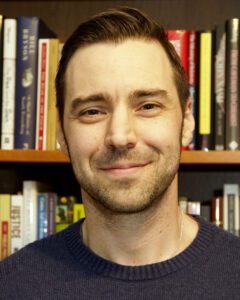Park University Mathematics Lecture to Focus on Paradoxes in Single Transferable Vote Elections
April 2, 2024 — Park University’s annual J. Malcolm Good Mathematics Lecture on Tuesday, April 16, will feature a timely discussion on “Paradoxes of Negative and Positive Involvement in Single Transferable Vote Elections.” The event will be held in the Jenkin and Barbara David Theater inside Alumni Hall on the University’s flagship Parkville Campus starting at 3 p.m. Admission is free and open to the public.
 The feature speaker will be David McCune, Ph.D., associate professor of mathematics at William Jewell College in Liberty, Mo. In his talk, McCune will explore how these paradoxes can occur, focusing on past political elections in the U.S. and Scotland, and how they can represent mathematical irrationality at the heart of single transferable voting method.
The feature speaker will be David McCune, Ph.D., associate professor of mathematics at William Jewell College in Liberty, Mo. In his talk, McCune will explore how these paradoxes can occur, focusing on past political elections in the U.S. and Scotland, and how they can represent mathematical irrationality at the heart of single transferable voting method.
“Imagine you were a candidate for a political office and you’ve just lost a close election. You ask your campaign manager, ‘Is there any way I could have won?’ and the manager responds, ‘You could have won if the turnout of voters who dislike you were increased,’” McCune said. “Would you assume you had misheard? How could it be possible that it’s better for your electoral chances to increase the turnout of people who don’t support you?”
Interestingly, McCune added “When using the election procedure of single transferable vote, a voting method widely used throughout the world, it is sometimes possible that a losing candidate could be turned into a winner if more of that candidate’s non-supporters cast ballots. Similarly, it is sometimes possible that a winning candidate can be turned into a loser if we increase turnout among that candidate’s supporters.”
McCune earned both his doctorate degree and Master of Science degree in mathematics from the University of Nebraska – Lincoln, and a Bachelor of Arts degree in English and mathematics from Baylor University.
Park University’s J. Malcolm Good Institute for Undergraduate Research promotes scholarly and creative activities in mathematical sciences at an undergraduate level. It supports undergraduate research via funding for resources and travel support for research purposes, as well as provides competitive scholarships to exceptional mathematics students.